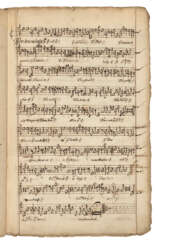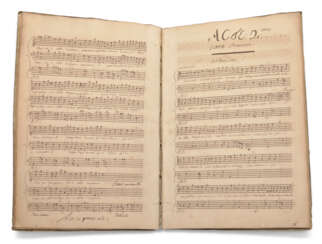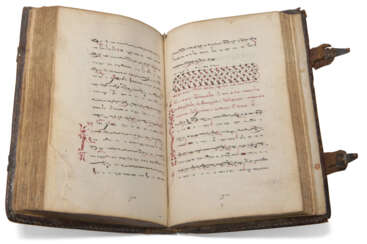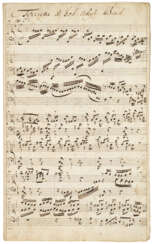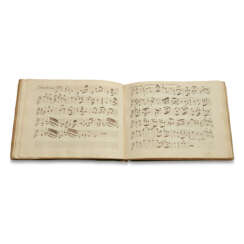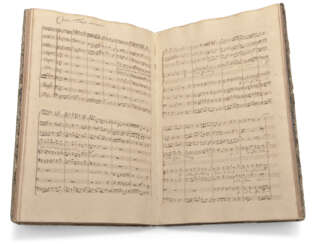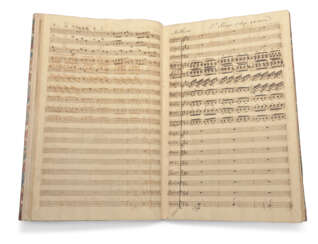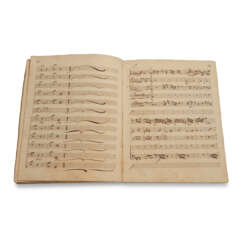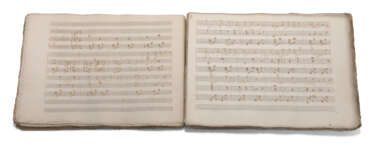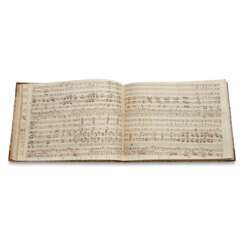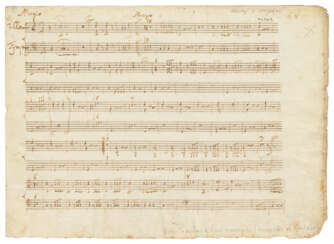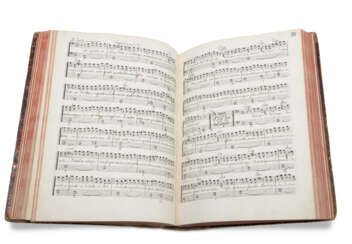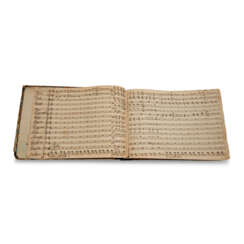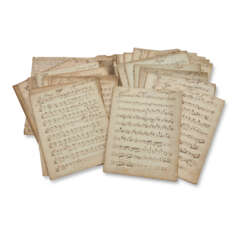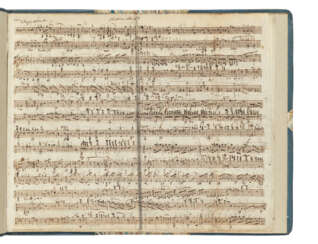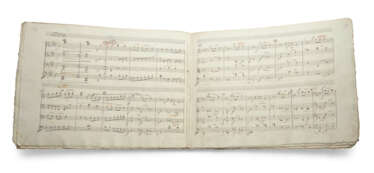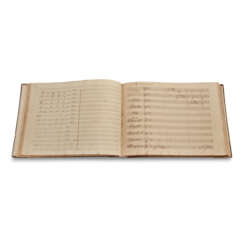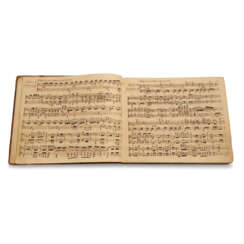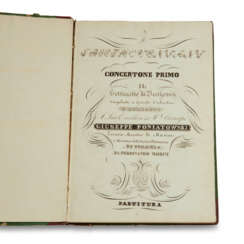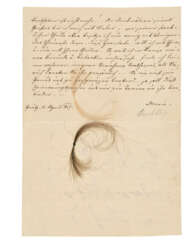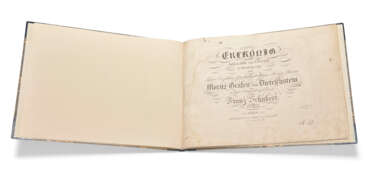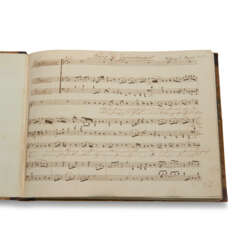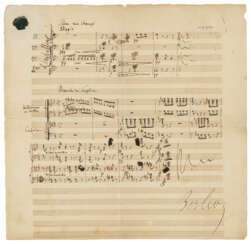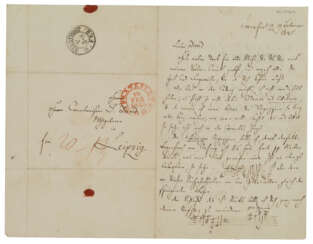
Letters, documents and manuscripts — The History of Western Music: Manuscripts from the Schøyen Collection
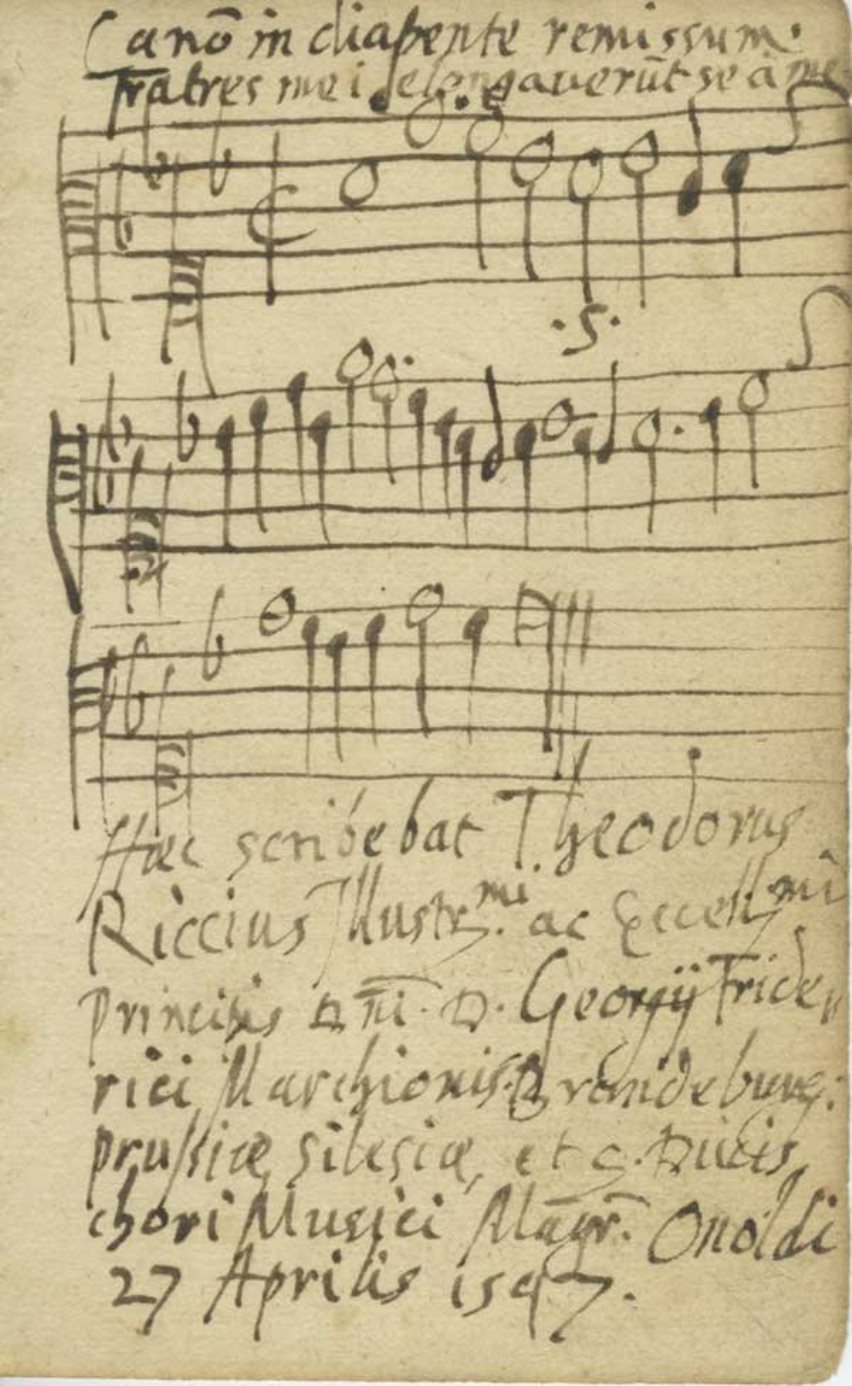
Teodoro Riccio was an Italian composer and Kapellmeister of the second half of the 16th century, who worked in Germany for most of his life.
Educated in church music, Riccio first worked as a Kapellmeister in the church of his hometown in Lombardy, where he composed his first madrigals. In 1575 he arrived at the court of Margrave Georg Friedrich of Ansbach-Brandenburg, to whom he dedicated a famous canon, and moved with the rest of the court musicians to Königsberg when the margrave became governor of the Duchy of Prussia in 1578. In 1585 Riccio was appointed Kapellmeister for life at the margrave's court.
Riccio's works are known mainly from printed sources, although several works survive in manuscripts in the Kremsmünster Abbey, the Koninklijke Bibliothek (Brussels), and the Nuremberg Archives.
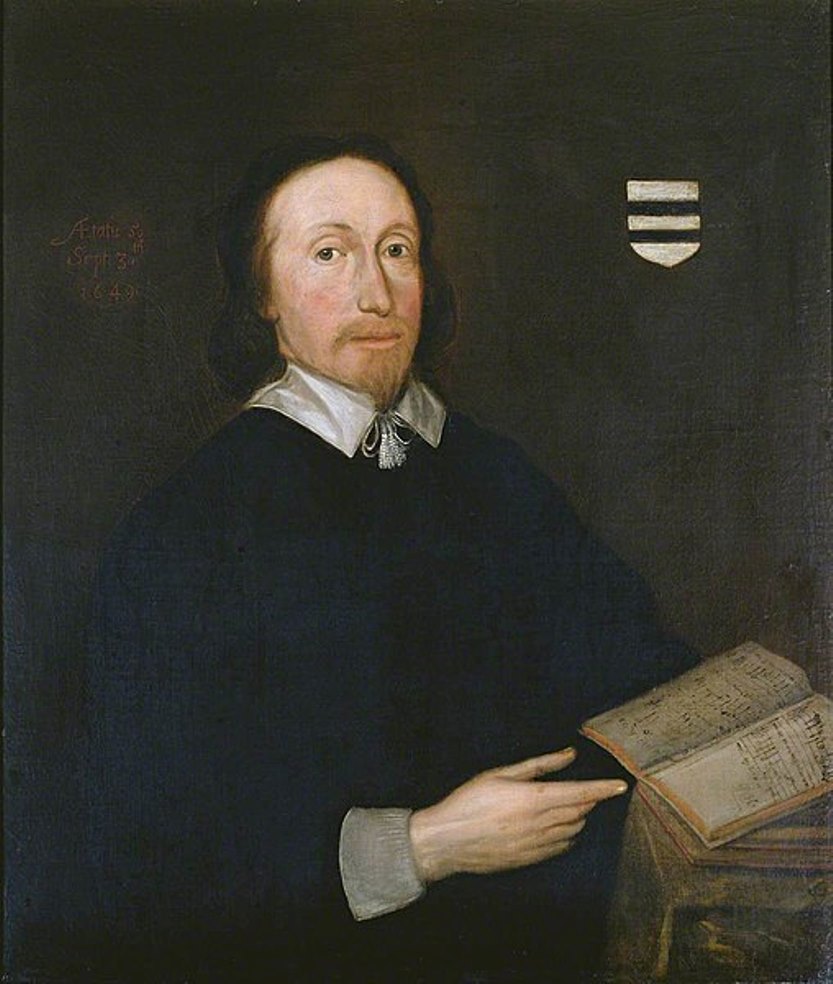
John Hilton the Younger was a British composer of the early Baroque period.
His father was the church musician, organist and composer John Hilton Senior, who died in Cambridge in 1609. Hilton Jr. earned a Bachelor of Music degree and became organist at St. Margaret's Cathedral in Westminster. In the 1630s he composed several oratorio-like works and later published a collection of 42 pieces. He is also credited as the author of several church hymns.
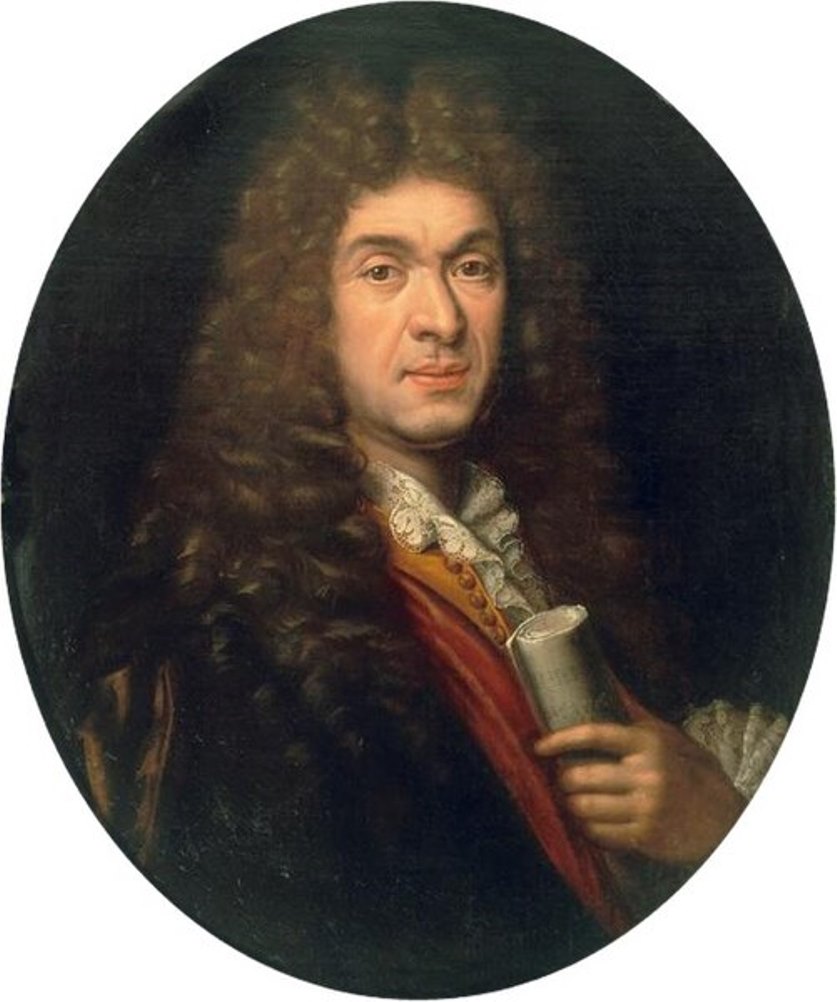
Jean-Baptiste Lully, born Giovanni Battista Lulli, was an Italian-born French composer, violinist, and conductor.
Lully spent most of his life working as a musician at the court of Louis XIV and became a French subject in 1661. He began composing music for court ballets in 1658 and collaborated with Molière on numerous comedy ballets between 1664 and 1670.
Lully is considered the leading composer of the French Baroque musical style, to which he contributed many of his own innovations. He composed several operas, chief among them the opera Armide, written especially for Louis XIV. Lully's other works include sacred works, dance music for various instruments, and suites for trumpet and strings.
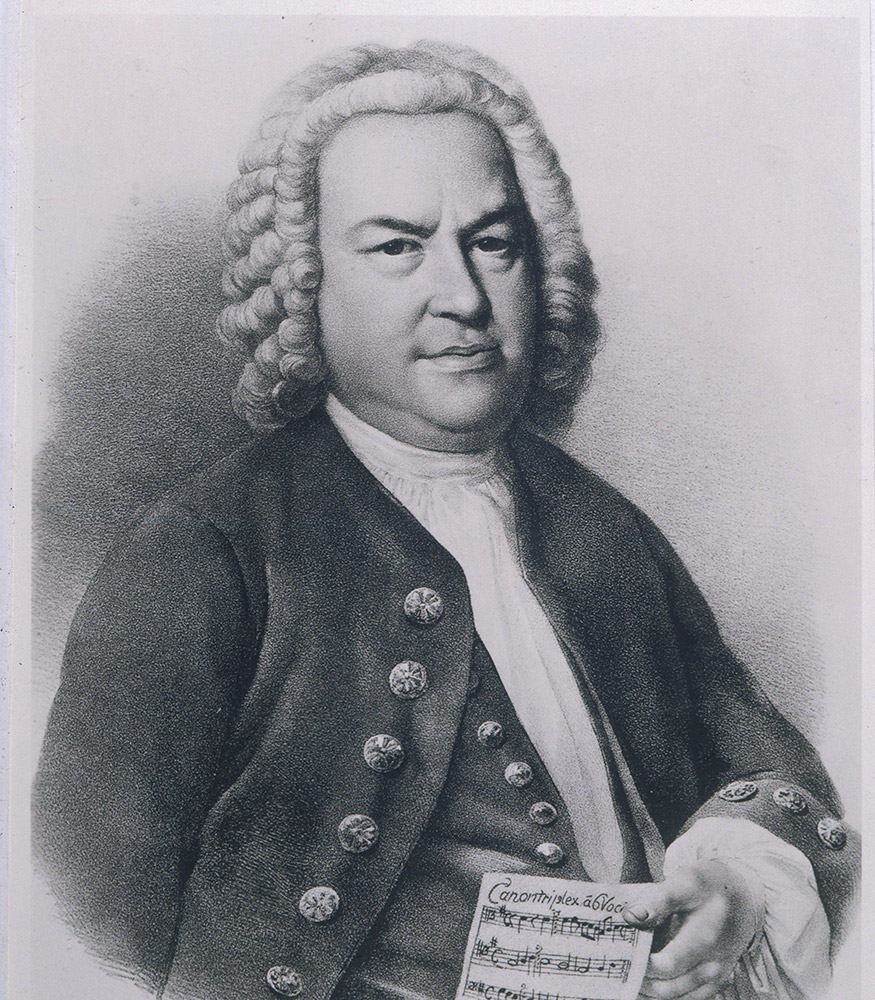
Johann Sebastian Bach was a German Baroque composer, Kapellmeister, organist and teacher.
Johann Sebastian Bach was the youngest child in the family of musician Johann Ambrosius Bach (1645-1695) and belonged to a large family of North German musicians whose dynasty he himself traced back to his great-great-grandfather Veit Bach, a Lutheran baker in the late 16th century. Johann was orphaned at an early age and was taken into care by his older brother, the organist Johann Christoph Bach. In August 1703 he was appointed official organist of the church in Arnstadt, then from 1714 he worked as Kapellmeister and concertmaster at the Weimar court, to which time his first compositions date. In 1736 he was appointed court composer to the King of Saxony, thus recognizing his merits as a composer and organist. While working as a concertmaster, Bach also mastered almost all the instruments in the orchestra.
In the last years of his life, Bach was nearly blind and living poorly, and his Baroque music was considered outdated as tastes changed. But in the 19th century, interest in Bach's works increased dramatically, and he became the favorite composer of many subsequent musicians. Johann Sebastian's sons Wilhelm Friedemann, Carl Philipp Emanuel and Johann Christian continued the family dynasty and also became musicians. And Johann Sebastian Bach himself was surrounded by students throughout his life.
Although his contemporaries admired Bach's playing on the harpsichord and organ, today it is his compositions that are considered some of the finest works of mature Baroque music. His most widely known works today include the Brandenburg Concertos, the Well-Tempered Clavier, the Masses in B minor, and many other masterpieces of church and instrumental music. Bach's rich legacy includes sacred and secular compositions, especially cantatas, organ pieces and concertos (Bach composed more than 1,000 musical works in all significant genres of his time, except opera), which influenced many later composers. Johann Sebastian Bach was able to encompass and unite the major styles, forms and national traditions developed in previous generations. Today he is considered one of the greatest composers of all time.
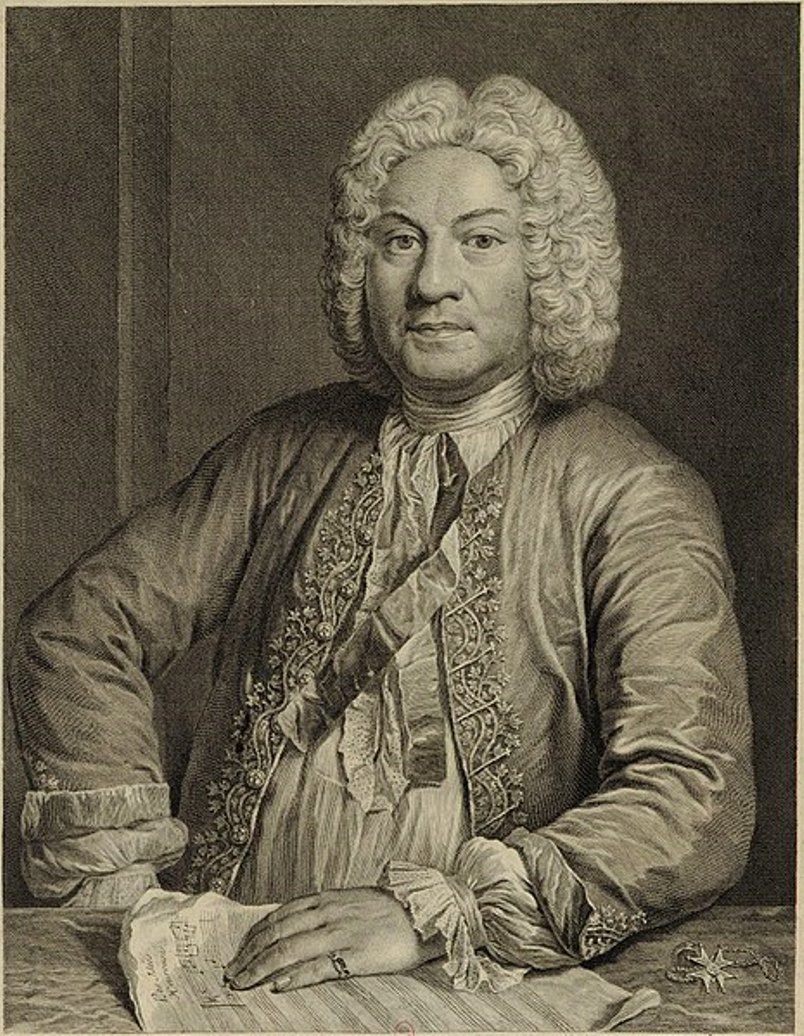
François Couperin was a French composer, organist and harpsichordist.
François Couperin is a member of a large dynasty of French musicians. At the age of 18, François succeeded his father, Charles Couperin (1638-1679), as organist at the Church of Saint-Gervais in Paris, and in 1693 he became one of the four organists of the Chapel Royal. He soon became a harpsichord teacher for the royal children, and in 1717 was appointed court harpsichordist.
François Couperin is known primarily for his harpsichord music; between 1713 and 1730 he published four books of more than 250 pieces for harpsichord. Some of them are characterized by complex accompaniment and dialogues between violin and bass, while others are light, graceful and expressive. Couperin's harpsichord pieces, even during the author's lifetime, gained great fame not only in France but also abroad. Couperin also wrote chamber music, including trio sonatas (for harpsichord and two violins) and "Royal Concertos", which he composed for Sunday evening royal entertainment. He also composed motets and other church music. Couperin's last and most significant liturgical work, Leçons de ténèbres (c. 1715), has no parallel in either French or Italian music of the period. Johann Sebastian Bach knew and appreciated this work by Couperin.
Couperin authored The Art of Touching the Clavier (1716), in which he explained in detail the technique of playing the harpsichord. And in his publications of the early 1720s, he suggested a wide variety of ways of combining French and Italian styles.
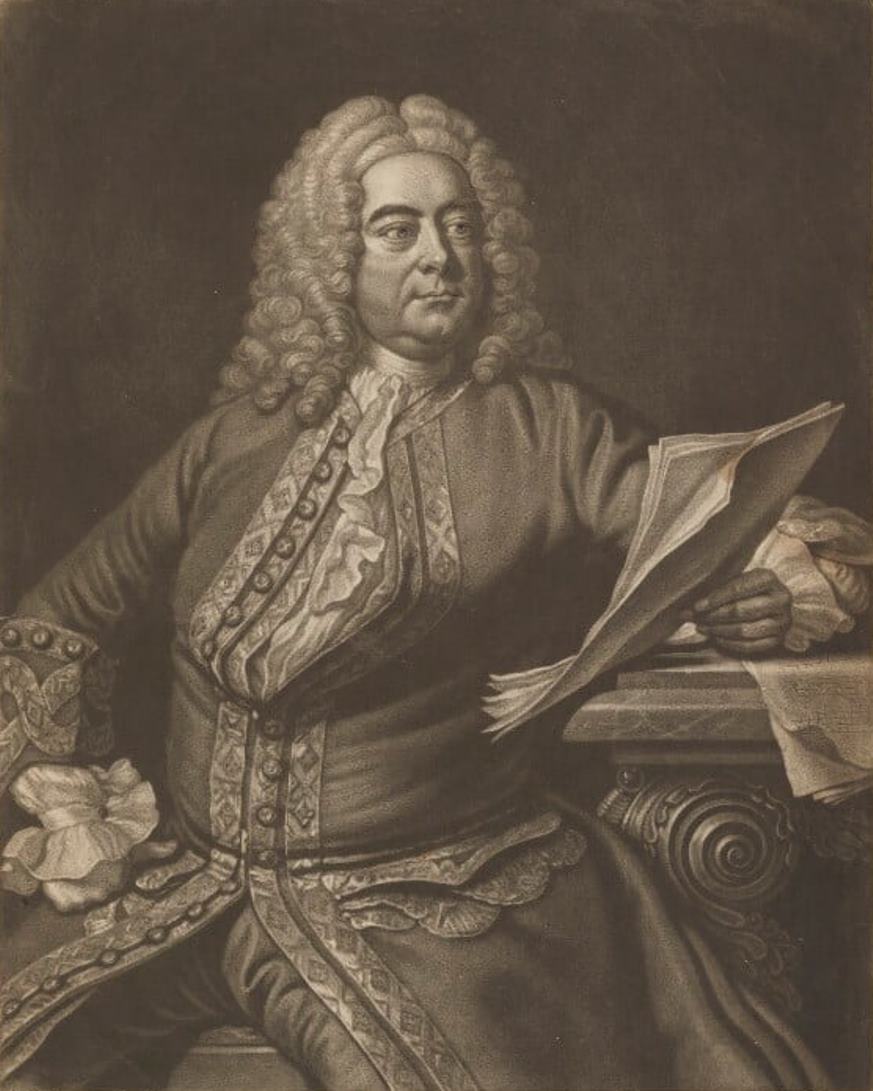
George Frideric Handel was a German-born English composer of the Baroque period.
After receiving a musical education, Handel worked briefly as an organist at the cathedral in Halle, then joined the violin section of the opera orchestra in Hamburg. After spending several years in Italy, he wrote many works there, including two operas. The style of Italian music permeated the composer's work throughout his life. Having become famous in Italy, in 1710 Handel was appointed Kapellmeister to the Elector of Hanover, the future King George I of England, and two years later he was already staging his operas in London.
In 1727 Handel became a British subject and was appointed composer to the Chapel Royal. In this capacity he wrote many musical works. From 1720 to 1728, operas at the Royal Theater in London were staged by the Royal Academy of Music, and Handel wrote the music for most of them.
In 1741, Handel wrote the most famous of his many oratorios, Messiah. Handel had a talent for musically portraying a human character in a single scene or aria - a gift he used with great dramatic power in his operas and oratorios. Although much of his music was vocal, Handel was also one of the recognized instrumental composers of the late Baroque era. Handel paid tribute to church music by composing many solemn hymns.
Handel's music has become an integral part of the national culture of England, and in Germany he is also honored as a major national composer.

George Frideric Handel was a German-born English composer of the Baroque period.
After receiving a musical education, Handel worked briefly as an organist at the cathedral in Halle, then joined the violin section of the opera orchestra in Hamburg. After spending several years in Italy, he wrote many works there, including two operas. The style of Italian music permeated the composer's work throughout his life. Having become famous in Italy, in 1710 Handel was appointed Kapellmeister to the Elector of Hanover, the future King George I of England, and two years later he was already staging his operas in London.
In 1727 Handel became a British subject and was appointed composer to the Chapel Royal. In this capacity he wrote many musical works. From 1720 to 1728, operas at the Royal Theater in London were staged by the Royal Academy of Music, and Handel wrote the music for most of them.
In 1741, Handel wrote the most famous of his many oratorios, Messiah. Handel had a talent for musically portraying a human character in a single scene or aria - a gift he used with great dramatic power in his operas and oratorios. Although much of his music was vocal, Handel was also one of the recognized instrumental composers of the late Baroque era. Handel paid tribute to church music by composing many solemn hymns.
Handel's music has become an integral part of the national culture of England, and in Germany he is also honored as a major national composer.
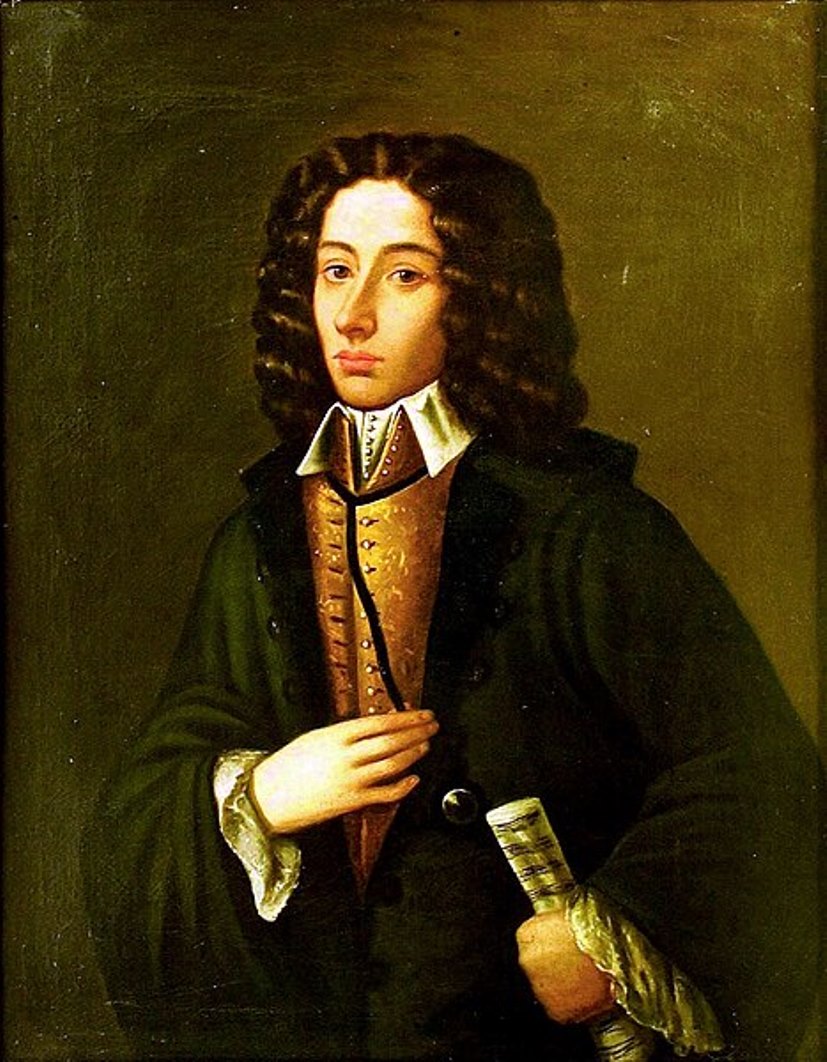
Giovanni Battista Pergolesi, born Giovanni Battista Draghi, was an Italian composer, violinist and organist, a leading representative of the Baroque and Neapolitan school.
Around 1720 he entered the Poveri Conservatory in Naples, where he earned a high reputation as a violinist. In 1732 Pergolesi was appointed maestro of the Prince of Stigliano's Chapel in Naples and soon composed his most successful work, the opera-buffa The Lady's Maid, which quickly gained popularity. His subsequent operas did not achieve the same success.
The Lady's Maid became much more popular when it was staged in Paris in 1752 after the composer's death. It also sparked fierce debate between conservatives, supporters of traditional French opera, and fans of the new Italian comic style. Pergolesi's opera-buffa became a forerunner of subsequent classical works: these are W. A. Mozart's The Marriage of Figaro, J. Rossini's The Barber of Seville, G. Verdi's Falstaff, I. Stravinsky's The Moor, and others.
Alongside secular music Pergolesi composed sacred music. His masses and hymns demonstrate the composer's ability to cope with large choral and instrumental forces, as well as with chamber music. Shortly before his death, he composed the cantata Stabat Mater, one of the composer's most inspired works, written for a small chamber ensemble (soprano, viola, string quartet and organ), filled with sublime, sincere and heartfelt lyrical feeling.
Fate, however, was not favorable to the young talent: Giovanni Battista Pergolesi died of tuberculosis in extreme poverty at the age of 26.

Giovanni Battista Pergolesi, born Giovanni Battista Draghi, was an Italian composer, violinist and organist, a leading representative of the Baroque and Neapolitan school.
Around 1720 he entered the Poveri Conservatory in Naples, where he earned a high reputation as a violinist. In 1732 Pergolesi was appointed maestro of the Prince of Stigliano's Chapel in Naples and soon composed his most successful work, the opera-buffa The Lady's Maid, which quickly gained popularity. His subsequent operas did not achieve the same success.
The Lady's Maid became much more popular when it was staged in Paris in 1752 after the composer's death. It also sparked fierce debate between conservatives, supporters of traditional French opera, and fans of the new Italian comic style. Pergolesi's opera-buffa became a forerunner of subsequent classical works: these are W. A. Mozart's The Marriage of Figaro, J. Rossini's The Barber of Seville, G. Verdi's Falstaff, I. Stravinsky's The Moor, and others.
Alongside secular music Pergolesi composed sacred music. His masses and hymns demonstrate the composer's ability to cope with large choral and instrumental forces, as well as with chamber music. Shortly before his death, he composed the cantata Stabat Mater, one of the composer's most inspired works, written for a small chamber ensemble (soprano, viola, string quartet and organ), filled with sublime, sincere and heartfelt lyrical feeling.
Fate, however, was not favorable to the young talent: Giovanni Battista Pergolesi died of tuberculosis in extreme poverty at the age of 26.
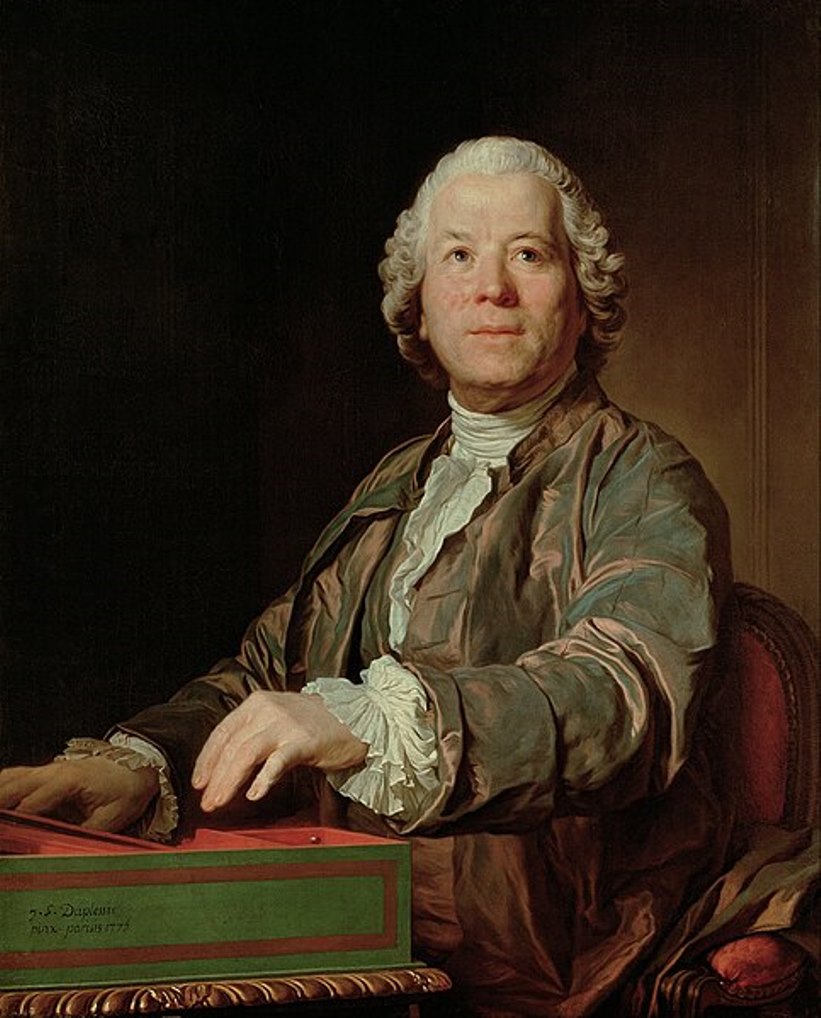
Christoph Willibald Gluck was a German classical composer and reformer of the opera genre.
Christoph showed a talent for music early on, playing violin and cello, leaving home and studying music with various teachers in Prague, Vienna and Milan. In 1741, Gluck had his first significant success with his first opera, Artasers, at the Milan theater. In 1745 Gluck, by then already well known as an opera composer, was invited to England, but in 1750 he settled in Vienna, where he lived for the rest of his life. While in Paris in 1773-79, he won the favor of Louis XVI's wife Marie Antoinette.
Christoph Gluck played a historic role in the formation of a new operatic style, becoming the main reformer in the transition from baroque to classical opera.
During his career, Christoph Gluck composed about 40 operas. Of these, his first "reformist" opera was Orpheus and Eurydice, staged in Vienna in 1762. Next were "Alceste" (1767), "Parida et Helena" (1770), "Iphigenia in Aulida" (1774), a French version of "Orpheus" (1774), and "Iphigenia in Tauris" (1779). He also wrote five ballets, of which Don Giovanni (1761) was one of the first successful action ballets.
Gluck spent the last eight years of his life in Vienna, continuing to work tirelessly. During these years he met several times with Wolfgang Mozart, who by then had already become a bright star.
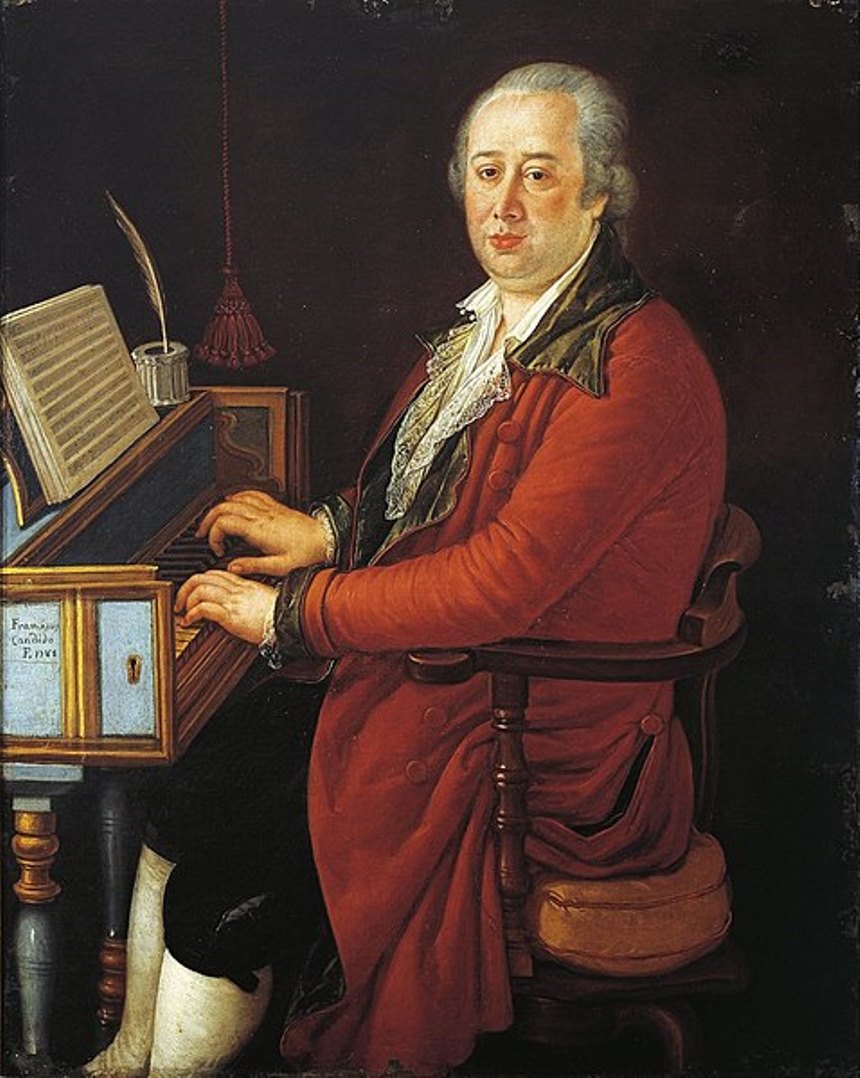
Domenico Cimarosa was an Italian opera composer of the Neapolitan school of the late 18th century.
For 11 years Cimarosa studied at the Conservatory of Santa Maria di Loreto. His first successful work was the comic opera Stravaganze del Conte, staged at the Teatro Fiorentini in Naples in 1772. It was followed by The Italian Woman in Londre (1778), which is still performed in Italy, and others. Cimarosa composed both serious and comic operas (more than 80 in all), which were staged in Rome, Naples, Florence, Vicenza, Milan and Turin.
In 1787, at the invitation of Catherine II, he traveled to Russia, replacing Giovanni Paisiello as court musician. He staged two operas in St. Petersburg, and in 1791 he traveled to Vienna at the invitation of Leopold II. There in 1792 Cimarosa staged his masterpiece, the opera The Secret Marriage, which made him famous. In 1793 he returned to Italy and composed many more works.
Cimarosa was a prolific and popular composer. His numerous operas are characterized by vivid imagery and rich comic content. He also wrote many choral works, including the cantata Maestro di cappella, a popular satire on modern opera rehearsal methods. His instrumental works include many sonatas for harpsichord and a concerto for two flutes.
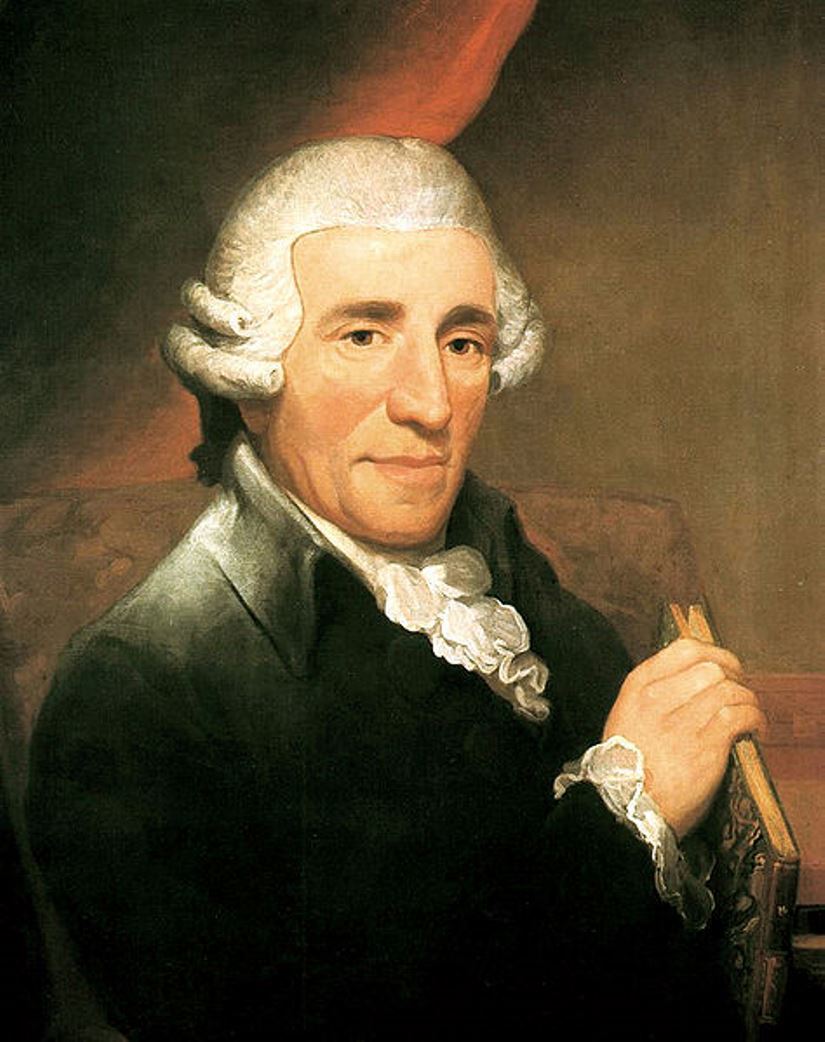
Franz Joseph Haydn was an Austrian composer of the classical school, who created the string quartet and symphony forms.
Haydn discovered unusual musical abilities very early, but the poverty of his family did not favor the development of his talents. He was a singer, interrupted earnings and engaged in musical self-education. Fate led young Haydn to Prince Pal Antal Esterhazy, whose wealthy and influential family of the Austrian Empire maintained his own orchestra. In 1766, Haydn became music director at the Esterhazy court and remained in that service for the rest of his life. In addition to his operas for the court, Haydn composed symphonies, string quartets and other chamber music. On one of his visits to Vienna, Haydn met Wolfgang Mozart, and their interactions brought many benefits to both great composers and musicians.
In the 1760s, Haydn's fame began to spread throughout Europe. In 1792, he met the young Ludwig van Beethoven and foreshadowed his greatest fame as a composer.
Haydn was an extremely prolific composer. He created 108 symphonies, many quartets, oratorios, sonatas, concertos, etc. As a true representative of the Enlightenment, Haydn was the most famous composer in Europe in the 18th century.
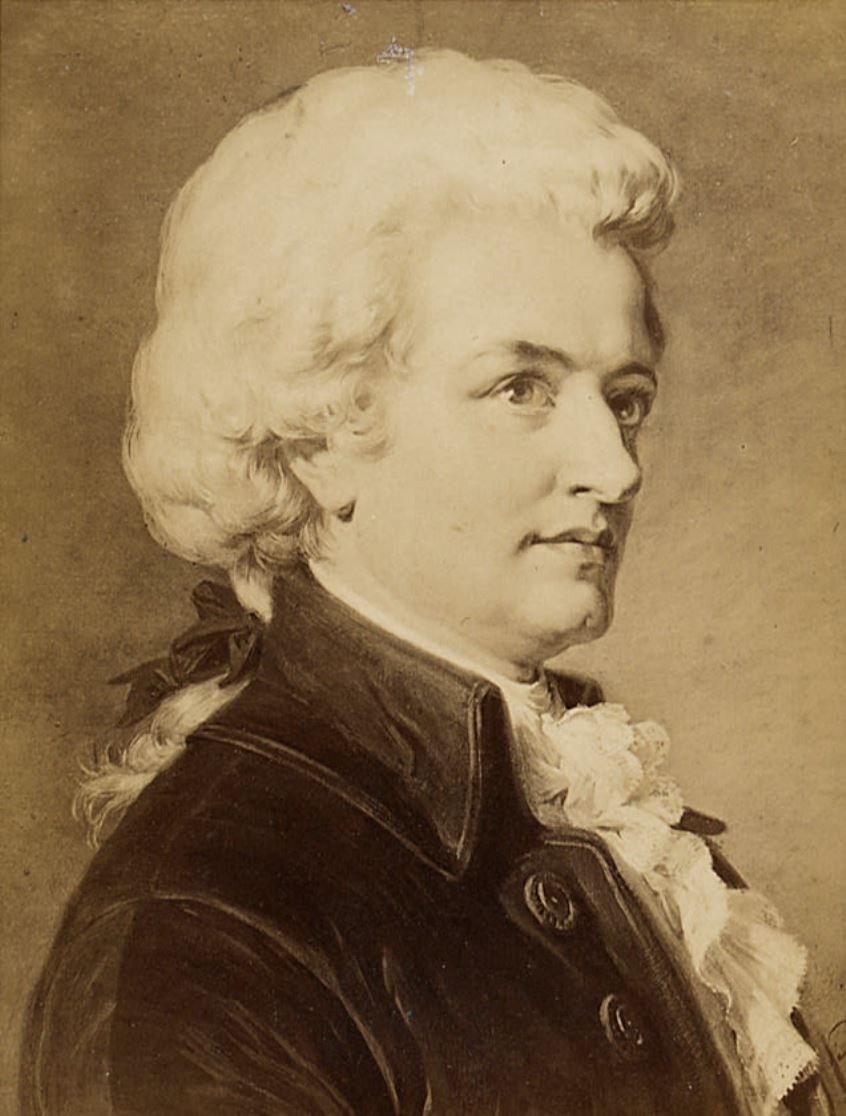
Wolfgang Amadeus Mozart, full name Johann Chrysostomus Wolfgang Amadeus Mozart, was an Austrian composer and virtuoso musician. Mozart is one of the greatest composers in music history on par with Beethoven and Haydn.
Wolfgang was born into the family of violinist and composer Leopold Mozart (1719-1787), at the age of five he had already begun composing and gave his first public performance. His older sister Maria Anna (1751-1829) was also a prodigy, and from 1763 Leopold and his children began traveling around Europe with performances.
Mozart had a phenomenal musical ear, memory and was a superb improviser. Unlike any other composer in music history, he was versatile and wrote in all musical genres of his time. During his short life, Mozart composed more than 800 works, many of which are recognized as the pinnacle of the symphonic, concert, chamber, opera and choral repertoire. The general public is familiar with the composer's three operas: The Marriage of Figaro, Don Giovanni and The Magic Flute.
Society did not immediately appreciate the scale of Mozart's genius. It was only many years later that the vivid image of a prodigy, a refined salon composer who could miraculously think through an entire work in his head, gave way to the image of a serious, meticulous and brilliant creator of music.

Wolfgang Amadeus Mozart, full name Johann Chrysostomus Wolfgang Amadeus Mozart, was an Austrian composer and virtuoso musician. Mozart is one of the greatest composers in music history on par with Beethoven and Haydn.
Wolfgang was born into the family of violinist and composer Leopold Mozart (1719-1787), at the age of five he had already begun composing and gave his first public performance. His older sister Maria Anna (1751-1829) was also a prodigy, and from 1763 Leopold and his children began traveling around Europe with performances.
Mozart had a phenomenal musical ear, memory and was a superb improviser. Unlike any other composer in music history, he was versatile and wrote in all musical genres of his time. During his short life, Mozart composed more than 800 works, many of which are recognized as the pinnacle of the symphonic, concert, chamber, opera and choral repertoire. The general public is familiar with the composer's three operas: The Marriage of Figaro, Don Giovanni and The Magic Flute.
Society did not immediately appreciate the scale of Mozart's genius. It was only many years later that the vivid image of a prodigy, a refined salon composer who could miraculously think through an entire work in his head, gave way to the image of a serious, meticulous and brilliant creator of music.

Wolfgang Amadeus Mozart, full name Johann Chrysostomus Wolfgang Amadeus Mozart, was an Austrian composer and virtuoso musician. Mozart is one of the greatest composers in music history on par with Beethoven and Haydn.
Wolfgang was born into the family of violinist and composer Leopold Mozart (1719-1787), at the age of five he had already begun composing and gave his first public performance. His older sister Maria Anna (1751-1829) was also a prodigy, and from 1763 Leopold and his children began traveling around Europe with performances.
Mozart had a phenomenal musical ear, memory and was a superb improviser. Unlike any other composer in music history, he was versatile and wrote in all musical genres of his time. During his short life, Mozart composed more than 800 works, many of which are recognized as the pinnacle of the symphonic, concert, chamber, opera and choral repertoire. The general public is familiar with the composer's three operas: The Marriage of Figaro, Don Giovanni and The Magic Flute.
Society did not immediately appreciate the scale of Mozart's genius. It was only many years later that the vivid image of a prodigy, a refined salon composer who could miraculously think through an entire work in his head, gave way to the image of a serious, meticulous and brilliant creator of music.
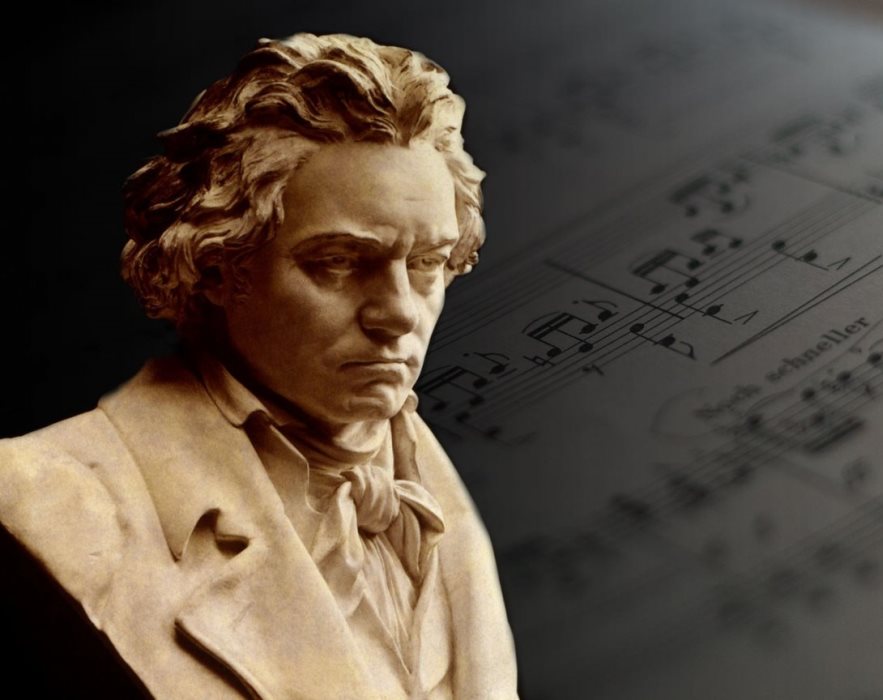
Ludwig van Beethoven was a German composer, pianist, and conductor, one of the most famous and celebrated composers in world history.
Beethoven showed an aptitude for music at a very early age; from the age of four his father began to teach him. Beethoven's early works - piano sonatas and symphonies - were composed under the strong influence of the music of the great classical composers Joseph Haydn and Wolfgang Amadeus Mozart. As Beethoven matured, however, he began to experiment with new forms and harmonic sequences, and his music became more complex and emotionally charged.
Unfortunately, at the height of his talent, Beethoven began to gradually lose his hearing, to the point of complete deafness by the end of his life. Despite this, he continued to compose and conduct, using special devices to feel the vibrations of the music.
Beethoven's work is considered pivotal in classical music and is a bridge between the classical and Romantic eras. His works vividly express a wide range of emotions, from triumph and joy to sadness and despair. Beethoven was also one of the first composers to include soloists and chorus in his symphonies. Beethoven's best-known works include nine symphonies, 32 piano sonatas, 16 string quartets and the heroic opera Fidelio. These and many other works have cemented Beethoven's place in music history as one of the greatest composers of all time. His music continues to be played and studied by musicians and music lovers around the world.

Ludwig van Beethoven was a German composer, pianist, and conductor, one of the most famous and celebrated composers in world history.
Beethoven showed an aptitude for music at a very early age; from the age of four his father began to teach him. Beethoven's early works - piano sonatas and symphonies - were composed under the strong influence of the music of the great classical composers Joseph Haydn and Wolfgang Amadeus Mozart. As Beethoven matured, however, he began to experiment with new forms and harmonic sequences, and his music became more complex and emotionally charged.
Unfortunately, at the height of his talent, Beethoven began to gradually lose his hearing, to the point of complete deafness by the end of his life. Despite this, he continued to compose and conduct, using special devices to feel the vibrations of the music.
Beethoven's work is considered pivotal in classical music and is a bridge between the classical and Romantic eras. His works vividly express a wide range of emotions, from triumph and joy to sadness and despair. Beethoven was also one of the first composers to include soloists and chorus in his symphonies. Beethoven's best-known works include nine symphonies, 32 piano sonatas, 16 string quartets and the heroic opera Fidelio. These and many other works have cemented Beethoven's place in music history as one of the greatest composers of all time. His music continues to be played and studied by musicians and music lovers around the world.

Ludwig van Beethoven was a German composer, pianist, and conductor, one of the most famous and celebrated composers in world history.
Beethoven showed an aptitude for music at a very early age; from the age of four his father began to teach him. Beethoven's early works - piano sonatas and symphonies - were composed under the strong influence of the music of the great classical composers Joseph Haydn and Wolfgang Amadeus Mozart. As Beethoven matured, however, he began to experiment with new forms and harmonic sequences, and his music became more complex and emotionally charged.
Unfortunately, at the height of his talent, Beethoven began to gradually lose his hearing, to the point of complete deafness by the end of his life. Despite this, he continued to compose and conduct, using special devices to feel the vibrations of the music.
Beethoven's work is considered pivotal in classical music and is a bridge between the classical and Romantic eras. His works vividly express a wide range of emotions, from triumph and joy to sadness and despair. Beethoven was also one of the first composers to include soloists and chorus in his symphonies. Beethoven's best-known works include nine symphonies, 32 piano sonatas, 16 string quartets and the heroic opera Fidelio. These and many other works have cemented Beethoven's place in music history as one of the greatest composers of all time. His music continues to be played and studied by musicians and music lovers around the world.

Ludwig van Beethoven was a German composer, pianist, and conductor, one of the most famous and celebrated composers in world history.
Beethoven showed an aptitude for music at a very early age; from the age of four his father began to teach him. Beethoven's early works - piano sonatas and symphonies - were composed under the strong influence of the music of the great classical composers Joseph Haydn and Wolfgang Amadeus Mozart. As Beethoven matured, however, he began to experiment with new forms and harmonic sequences, and his music became more complex and emotionally charged.
Unfortunately, at the height of his talent, Beethoven began to gradually lose his hearing, to the point of complete deafness by the end of his life. Despite this, he continued to compose and conduct, using special devices to feel the vibrations of the music.
Beethoven's work is considered pivotal in classical music and is a bridge between the classical and Romantic eras. His works vividly express a wide range of emotions, from triumph and joy to sadness and despair. Beethoven was also one of the first composers to include soloists and chorus in his symphonies. Beethoven's best-known works include nine symphonies, 32 piano sonatas, 16 string quartets and the heroic opera Fidelio. These and many other works have cemented Beethoven's place in music history as one of the greatest composers of all time. His music continues to be played and studied by musicians and music lovers around the world.

Ludwig van Beethoven was a German composer, pianist, and conductor, one of the most famous and celebrated composers in world history.
Beethoven showed an aptitude for music at a very early age; from the age of four his father began to teach him. Beethoven's early works - piano sonatas and symphonies - were composed under the strong influence of the music of the great classical composers Joseph Haydn and Wolfgang Amadeus Mozart. As Beethoven matured, however, he began to experiment with new forms and harmonic sequences, and his music became more complex and emotionally charged.
Unfortunately, at the height of his talent, Beethoven began to gradually lose his hearing, to the point of complete deafness by the end of his life. Despite this, he continued to compose and conduct, using special devices to feel the vibrations of the music.
Beethoven's work is considered pivotal in classical music and is a bridge between the classical and Romantic eras. His works vividly express a wide range of emotions, from triumph and joy to sadness and despair. Beethoven was also one of the first composers to include soloists and chorus in his symphonies. Beethoven's best-known works include nine symphonies, 32 piano sonatas, 16 string quartets and the heroic opera Fidelio. These and many other works have cemented Beethoven's place in music history as one of the greatest composers of all time. His music continues to be played and studied by musicians and music lovers around the world.

Ludwig van Beethoven was a German composer, pianist, and conductor, one of the most famous and celebrated composers in world history.
Beethoven showed an aptitude for music at a very early age; from the age of four his father began to teach him. Beethoven's early works - piano sonatas and symphonies - were composed under the strong influence of the music of the great classical composers Joseph Haydn and Wolfgang Amadeus Mozart. As Beethoven matured, however, he began to experiment with new forms and harmonic sequences, and his music became more complex and emotionally charged.
Unfortunately, at the height of his talent, Beethoven began to gradually lose his hearing, to the point of complete deafness by the end of his life. Despite this, he continued to compose and conduct, using special devices to feel the vibrations of the music.
Beethoven's work is considered pivotal in classical music and is a bridge between the classical and Romantic eras. His works vividly express a wide range of emotions, from triumph and joy to sadness and despair. Beethoven was also one of the first composers to include soloists and chorus in his symphonies. Beethoven's best-known works include nine symphonies, 32 piano sonatas, 16 string quartets and the heroic opera Fidelio. These and many other works have cemented Beethoven's place in music history as one of the greatest composers of all time. His music continues to be played and studied by musicians and music lovers around the world.

Ludwig van Beethoven was a German composer, pianist, and conductor, one of the most famous and celebrated composers in world history.
Beethoven showed an aptitude for music at a very early age; from the age of four his father began to teach him. Beethoven's early works - piano sonatas and symphonies - were composed under the strong influence of the music of the great classical composers Joseph Haydn and Wolfgang Amadeus Mozart. As Beethoven matured, however, he began to experiment with new forms and harmonic sequences, and his music became more complex and emotionally charged.
Unfortunately, at the height of his talent, Beethoven began to gradually lose his hearing, to the point of complete deafness by the end of his life. Despite this, he continued to compose and conduct, using special devices to feel the vibrations of the music.
Beethoven's work is considered pivotal in classical music and is a bridge between the classical and Romantic eras. His works vividly express a wide range of emotions, from triumph and joy to sadness and despair. Beethoven was also one of the first composers to include soloists and chorus in his symphonies. Beethoven's best-known works include nine symphonies, 32 piano sonatas, 16 string quartets and the heroic opera Fidelio. These and many other works have cemented Beethoven's place in music history as one of the greatest composers of all time. His music continues to be played and studied by musicians and music lovers around the world.
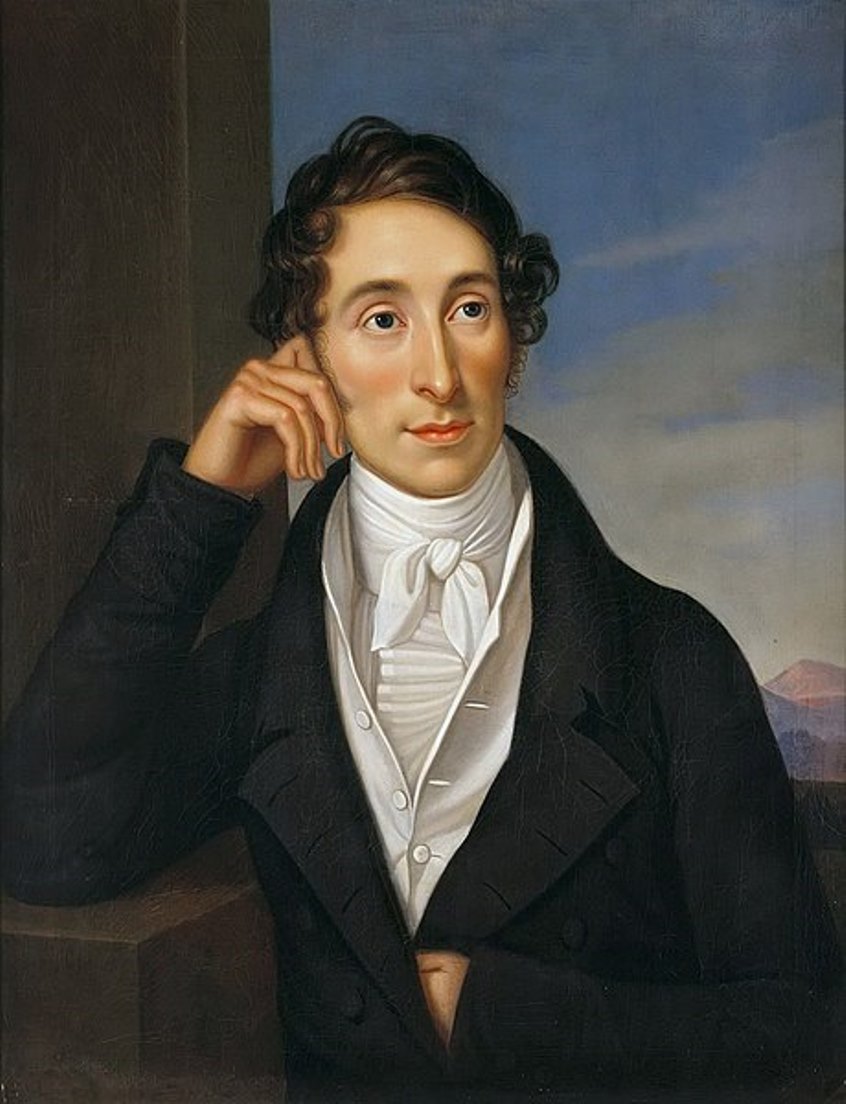
Carl Maria von Weber, full name Carl Maria Friedrich Ernst von Weber, was a German opera composer and conductor during the transition from classical to romantic music, pianist and music critic.
Weber was born into a musical and theatrical family, and his father cherished dreams of making him a second Mozart. The young Weber received his first appointment when he became the musical director of Duke Eugene of Württemberg, for whose private orchestra he wrote two symphonies, then he was secretary at the court of King Frederick I of Württemberg. At the same time he composed musical works, gaining experience and knowledge.
In 1813 Weber was appointed conductor of the opera in Prague, and four years later he was appointed director of the German opera in Dresden. Here he deployed his talents, taking on the entire job of preparing an opera production: he selected the repertoire, staff and actors; he handled the scenery, lighting and staging, as well as the orchestra and singers, taking special care to ensure that each performer fully understood the words and plot of each opera. The composer also found time to compose his own works.
During this period he created the opera The Free Rifleman (1821), where he was able to free German opera from French and Italian influences. The opera was first successfully staged in Berlin and then traveled throughout Europe. "The Free Rifleman" is the most popular German opera written to date, and it marked the beginning of German Romantic opera. Weber also wrote the operas Euryanthe (1823), Oberon (1826), and others.
Carl Weber composed many fugues, sonatas, concertos, and sacred music, and was also one of the significant piano virtuosos and music critics. From 1809 to 1818, he wrote a considerable number of reviews and quite incisive music criticisms. All his activities, music and critical writings promoted the ideals of Romanticism as an art in which feeling prevails over form and heart over head.
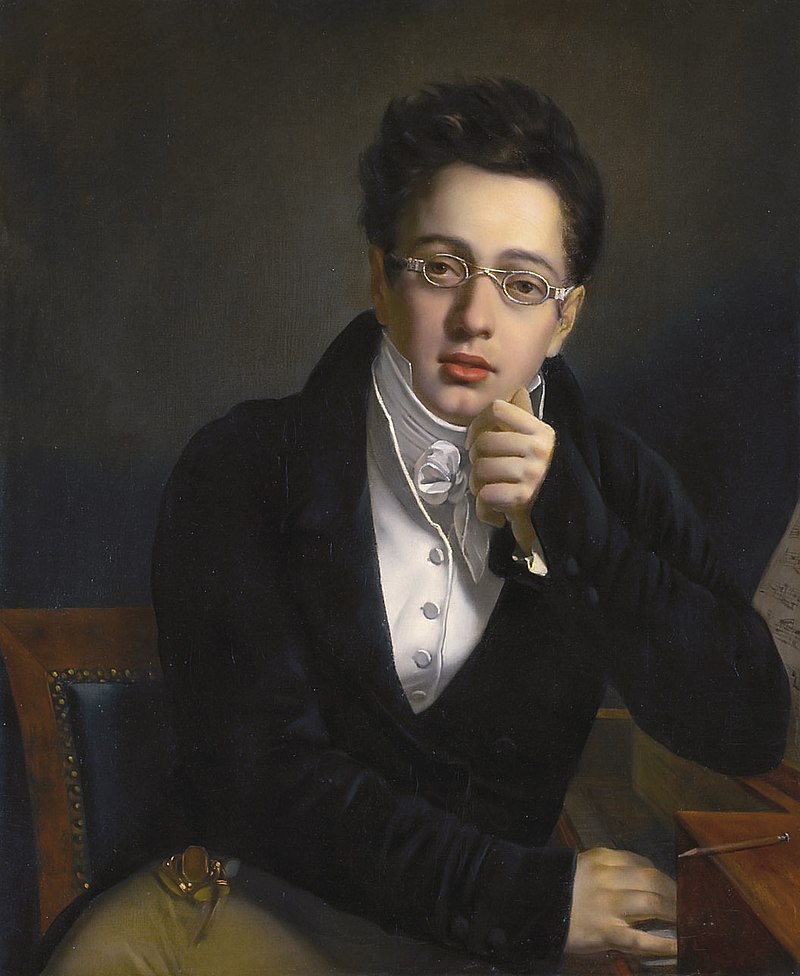
Franz Peter Schubert was an Austrian composer who combined classical and romantic music.
Franz was born into a musical family, where a quartet played at home and his father founded a music school. The future composer played the violin, piano and organ. At the age of 10, the young Schubert won a place in the Vienna Imperial Court Chapel Choir and quickly gained a reputation as an aspiring composer, writing several light string quartets. In 1814 Schubert began teaching, but at the same time he continuously composed a wide variety of works. These included 145 songs, the Second and Third Symphonies, two sonatas and a number of miniatures for solo piano, two masses and other short choral works, four stage works, a string quartet, and much more.
Soon the popularity of Schubert's dance music and songs grew so much that musical evenings known as "Schubertiades", where Schubert performed his own compositions while accompanying himself on the piano, became fashionable in Vienna. The talented composer effortlessly composed many masterpieces, including the song cycles Lonely Müllerin and Winterreise, as well as the Eighth ("Unfinished") and Ninth ("Great") Symphonies, the Octet for winds, three string quartets, two piano trios, the String Quintet, the Wanderer Fantasia and six sonatas for solo piano.
Despite his boundless talent, Franz Schubert was always insecure, indecisive and reserved, causing him to be tormented by lack of money throughout his life. The composer was able to buy his own piano almost at the end of his short life - with the royalties from his first and only public concert in March 1828. Eight months later, the brilliant musician died of illness at the age of 31.

Wolfgang Amadeus Mozart, full name Johann Chrysostomus Wolfgang Amadeus Mozart, was an Austrian composer and virtuoso musician. Mozart is one of the greatest composers in music history on par with Beethoven and Haydn.
Wolfgang was born into the family of violinist and composer Leopold Mozart (1719-1787), at the age of five he had already begun composing and gave his first public performance. His older sister Maria Anna (1751-1829) was also a prodigy, and from 1763 Leopold and his children began traveling around Europe with performances.
Mozart had a phenomenal musical ear, memory and was a superb improviser. Unlike any other composer in music history, he was versatile and wrote in all musical genres of his time. During his short life, Mozart composed more than 800 works, many of which are recognized as the pinnacle of the symphonic, concert, chamber, opera and choral repertoire. The general public is familiar with the composer's three operas: The Marriage of Figaro, Don Giovanni and The Magic Flute.
Society did not immediately appreciate the scale of Mozart's genius. It was only many years later that the vivid image of a prodigy, a refined salon composer who could miraculously think through an entire work in his head, gave way to the image of a serious, meticulous and brilliant creator of music.

Franz Joseph Haydn was an Austrian composer of the classical school, who created the string quartet and symphony forms.
Haydn discovered unusual musical abilities very early, but the poverty of his family did not favor the development of his talents. He was a singer, interrupted earnings and engaged in musical self-education. Fate led young Haydn to Prince Pal Antal Esterhazy, whose wealthy and influential family of the Austrian Empire maintained his own orchestra. In 1766, Haydn became music director at the Esterhazy court and remained in that service for the rest of his life. In addition to his operas for the court, Haydn composed symphonies, string quartets and other chamber music. On one of his visits to Vienna, Haydn met Wolfgang Mozart, and their interactions brought many benefits to both great composers and musicians.
In the 1760s, Haydn's fame began to spread throughout Europe. In 1792, he met the young Ludwig van Beethoven and foreshadowed his greatest fame as a composer.
Haydn was an extremely prolific composer. He created 108 symphonies, many quartets, oratorios, sonatas, concertos, etc. As a true representative of the Enlightenment, Haydn was the most famous composer in Europe in the 18th century.
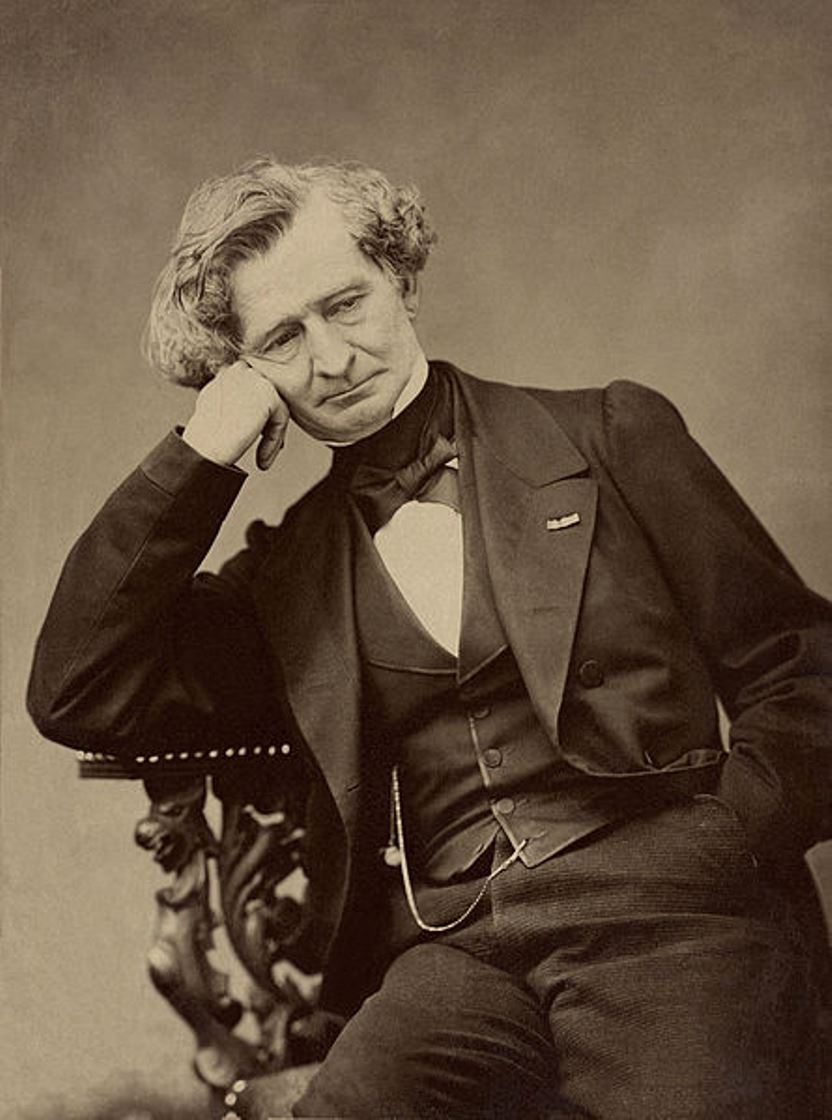
Hector Berlioz, full name Louis-Hector Berlioz, was a French composer, conductor, and music critic of the Romantic era.
Berlioz received his primary education from his father, an enlightened physician, who gave him his first lessons in music and Latin. By the age of 12, he was already composing music for local chamber ensembles and learning to play the guitar and flute with virtuosity. In 1821 his father sent him to Paris to study medicine, and he received his first scientific degree. But in parallel, he often visited the Paris Opera, where he studied the entire repertoire on the score.
Against the will of his parents, Berlioz took a compulsory course of study at the Conservatory of Paris and in 1830 received the Prix de Rome. In Italy he met the Russian composer Mikhail Glinka and became lifelong friends with Mendelssohn. From 1832 Berlioz worked for 30 years as a music critic for periodicals. He was acquainted with many of the leading writers and musicians of his time, including Victor Hugo, Alexandre Dumas, Niccolò Paganini, and George Sand.
Berlioz adored the works of Weber and Beethoven, as well as Gluck, and tirelessly introduced audiences to their works. As a result of his many trips as a conductor to Germany, Belgium, England, Russia, and Austria-Hungary, he taught the leading orchestras of Europe a new style.
Berlioz during these years wrote, among other things, the "Symphonie Fantastique" (1830) that made him famous, and the symphony "Harold in Italy" (1834). After a concert in 1838, where he conducted their performance, the famous violin virtuoso Paganini declared Hector Berlioz a continuator of Beethoven's musical traditions and presented him with 20,000 francs. A grateful Berlioz wrote a choral symphony, Romeo and Juliet, dedicated to Paganini.
In 1844, Berlioz created "Treatise on Modern Instrumentation and Orchestration", which is not just a technical manual, it served as an introduction to the aesthetics of expression in music for generations to come. Among Berlioz's dramatic works, The Damnation of Faust (1846) and The Nativity (1854) are world-famous.
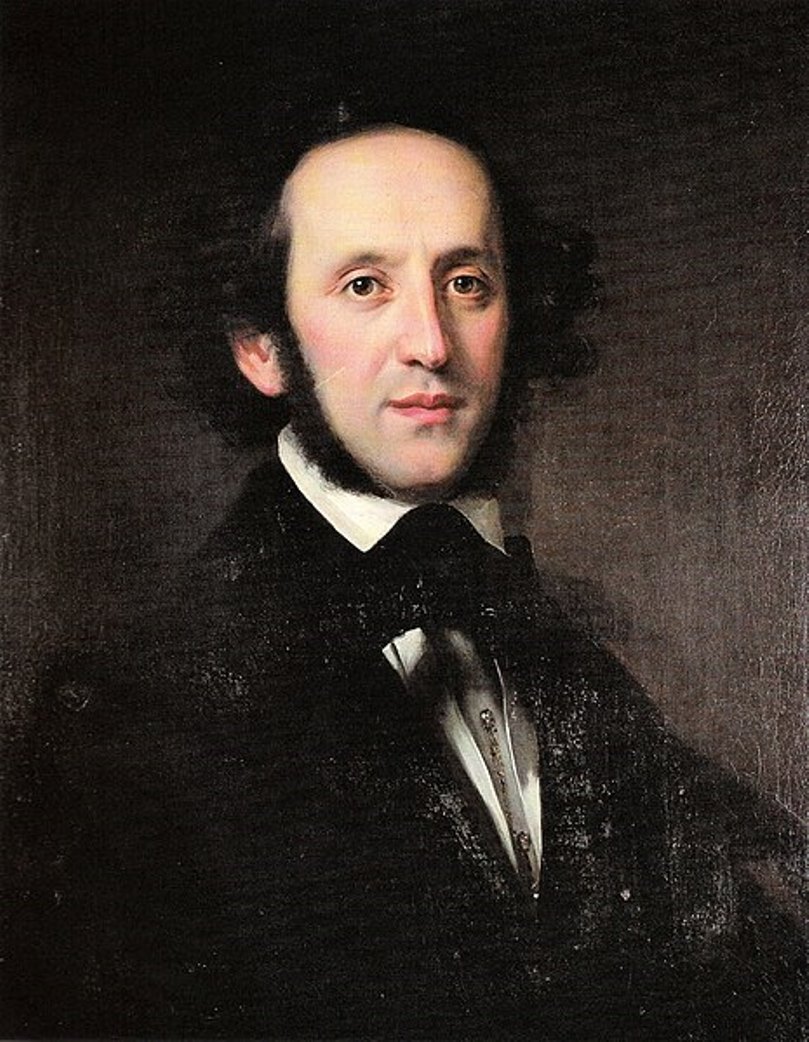
Felix Mendelssohn (full name Jakob Ludwig Felix Mendelssohn Bartholdy) was a German composer, pianist, conductor, teacher, and one of the greatest representatives of Romanticism in music.
Felix was born into a Jewish musical family that later converted to Christianity. He received a versatile education and already as a child wrote many musical compositions, including 5 operas, 11 symphonies for string orchestra, concertos, sonatas and fugues. Mendelssohn's first public performance took place in Berlin in 1818, when he was nine years old. In 1821 Mendelssohn was introduced to J.W. von Goethe, for whom he performed works by J.S. Bach and Mozart and to whom he dedicated his Piano Quartet No. 3 in B minor. A friendship developed between the famous wise poet and the 12-year-old musician.
A few years later, the talented musician began conducting in various orchestras in Europe, and became acquainted with Carl Weber. In England, where Mendelssohn visited very often, by the middle of the 19th century his music had become very popular, even with Queen Victoria he was the most favorite composer. He dedicated his Symphony No. 3 in A minor major (Scottish Symphony) to the Queen.
Among Mendelssohn's most famous works are A Midsummer Night's Dream (1826), the Italian Symphony (1833), a violin concerto (1844), two piano concertos (1831, 1837), the oratorio Elijah (1846) and several chamber pieces. The tradition of playing the "Wedding March" from A Midsummer Night's Dream in wedding processions dates back to its performance at the wedding of a royal princess in 1858, already after Mendelssohn's death.
In 1843, Mendelssohn founded a conservatory in Leipzig, where he taught composition with Schumann. Mendelssohn was one of the first great Romantic composers of the nineteenth century.




